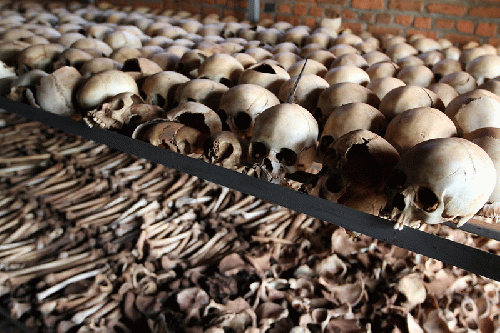The lessons have not been learned. Thirty years after the genocide in Rwanda when extremists from the Hutu ethnic group launched a 100-day killing spree, during which 800,000 members of the Tutsi minority and Hutu moderates were slaughtered, the world is still witnessing death on a massive scale.
Rwanda President Paul Kagame led a sombre commemoration ceremony in the capital Kigali on Sunday on the 30th anniversary of the Rwandan genocide. Foreign visitors included the leaders of South Africa, Congo, Ethiopia, Central African Republic and Tanzania, as well as Israeli President Isaac Herzog. Former US and French presidents Bill Clinton and Nicolas Sarkozy also attended.
Kagame and other Rwandan officials have long blamed the international community for ignoring warnings about the killings and allowing the 1994 genocide to happen, and some Western leaders have expressed regret.
After leaving office, former US President Bill Clinton cited the genocide as a failure of his administration. French President Emmanuel Macron, in a prerecorded video ahead of Sunday's ceremonies, said that France and its allies could have stopped the genocide but lacked the will to do so. Macron's declaration came three years after he acknowledged the "overwhelming responsibility" of France -- Rwanda's closest European ally in 1994 -- for failing to stop Rwanda's slide into the slaughter.
"It was the international community that failed all of us, whether from contempt or cowardice," Kagame said in a speech after lighting a flame of remembrance and laying a wreath at a memorial site holding the remains of 250,000 genocide victims in Kigali.
The genocide started on April 6, 1994. Rwandan President Juvenal Habyarimana and Burundian President Cyprien Ntaryamira were killed when Habyarimana's plane they were traveling in was shot down. It is unclear who was responsible, but it was likely either extremist Hutu elements within the government and military or the predominantly Tutsi Rwandan Patriotic Front (RPF) led by Paul Kagame, now president of Rwanda. What is known is that the event served as a catalyst for the genocidal killing of Tutsis and moderate Hutus that began soon after.
On June 22, the UN Security Council authorized the deployment of French forces in southwest Rwanda under 'Operation Turquoise' to create a 'safe' area in the government-controlled part of the country, but this did not prevent the murders from continuing.
It was only on July 18 that the RPF finally declared a de facto ceasefire.
Today, the effects of the genocide still linger.
Rwanda's international relations, particularly with its neighboring countries: the Democratic Republic of Congo (DRC), Burundi, and Uganda, are affected by the fallout of the genocide. Despite Rwanda's relative peace domestically today, its external relations have been fraught with accusations and counter-accusations of interference and support for armed groups.
The root of the tensions between Rwanda and the DRC lies in the aftermath of the genocide and the subsequent cross-border conflicts. Rwanda has been accused by the DRC and international entities of supporting armed groups within the DRC, most notably the M23 rebel group, which consists of Tutsi fighters. Rwanda has, in turn, accused the DRC of supporting groups like the Democratic Forces for the Liberation of Rwanda (FDLR), which includes remnants of the Hutu forces responsible for the 1994 genocide. These accusations have led to military engagements and a strained relationship characterized by mutual distrust and sporadic violence.
Rwanda's relationship with Burundi has been similarly tense, particularly since 2015, when Burundi descended into political crisis following President Pierre Nkurunziza's decision to seek a third term. Rwanda has been accused by Burundi of supporting groups opposed to the Nkurunziza government, specifically rebel groups launching attacks from Rwandan territory. These allegations have contributed to a cooling of relations, with both countries engaging in a war of words and accusations that have at times led to the closing of borders and restrictions on the movement of people and goods.
The relationship between Rwanda and Uganda has experienced periods of cooperation and conflict since the 1990s. The most recent tensions arose from allegations by Rwanda that Uganda was supporting anti-Kagame rebel groups, including the Rwanda National Congress (RNC) and others opposed to the Rwandan government. Uganda has countered with accusations that Rwanda has infiltrated its security services and is undermining its sovereignty. This led to a closure of the common border for a significant period, affecting trade and movement between the two countries. While there have been efforts to normalize relations, including high-level meetings and agreements to reopen borders and restore relations, mutual suspicion remains.
These tensions should be viewed within the broader context of the Great Lakes region's complex political and security dynamics. The area is characterized by porous borders, the presence of numerous armed groups, and a history of ethnic tensions and conflicts. External relations among countries in the region are often influenced by internal politics, historical grievances, and the strategic interests of ruling elites.
Rwanda's stance and actions in this volatile region can be interpreted through various lenses, including its own security imperatives, the legacy of the genocide, and its ambition to be a regional leader.
(Note: You can view every article as one long page if you sign up as an Advocate Member, or higher).





